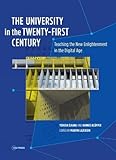The University in the Twenty-first Century : Teaching the New Enlightenment in the Digital Age / Yehuda Elkana, Hannes Klöpper; ed. by Marvin Lazerson.
Material type: TextPublisher: Budapest ; New York : Central European University Press, [2022]Copyright date: ©2016Description: 1 online resource (302 p.)Content type:
TextPublisher: Budapest ; New York : Central European University Press, [2022]Copyright date: ©2016Description: 1 online resource (302 p.)Content type: - 9789633860397
- 378.001 23
- LB2322.2 .E45 2016eb
- online - DeGruyter
| Item type | Current library | Call number | URL | Status | Notes | Barcode | |
|---|---|---|---|---|---|---|---|
 eBook
eBook
|
Biblioteca "Angelicum" Pont. Univ. S.Tommaso d'Aquino Nuvola online | online - DeGruyter (Browse shelf(Opens below)) | Online access | Not for loan (Accesso limitato) | Accesso per gli utenti autorizzati / Access for authorized users | (dgr)9789633860397 |
Frontmatter -- TABLE OF CONTENTS -- Preface -- Foreword -- Chapter 1 Introduction -- Chapter 2 The Idea of the University -- Chapter 3 The Aims of the University -- Chapter 4 A Manifesto for Curriculum Reform -- Chapter 5 The Renaissance of Rhetoric and Meaning -- Chapter 6 New Curricula and New Disciplines -- Chapter 7 Rethinking the Unity of Research and Teaching -- Chapter 8 Democracy and the Philosophy of Education -- Chapter 9 Doctoral Education -- Chapter 10 The Status Quo of Technology in Higher Education -- Chapter 11 The University in the Digital Age -- Bibliography -- Name Index
restricted access online access with authorization star
http://purl.org/coar/access_right/c_16ec
This volume addresses the broad spectrum of challenges confronting the university of the 21st century. Elkana and Klöpper place special emphasis on the questions regarding the very idea and purposes of universities, especially as viewed through curriculum—what is taught—and pedagogy—how it is taught. The ideas recommended here for reform concern especially undergraduate or Bachelor degree programs in all areas of study, from the humanities and social sciences to the natural sciences, the technical fields, law, medicine, and other professions. The core thesis of this book rests on the emergence of a 'New Enlightenment', which requires a revolution in curriculum and teaching in order to translate the academic philosophy of global contextualism into universal practice or application. The university is asked to revamp teaching in order to foster critical thinking that would serve students their entire lives. This book calls for universities to become truly integrated rather than remaining collections of autonomous agencies more committed to competition among themselves than cooperation in the larger interest of learning.
Mode of access: Internet via World Wide Web.
In English.
Description based on online resource; title from PDF title page (publisher's Web site, viewed 30. Aug 2022)


